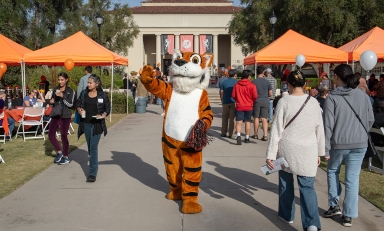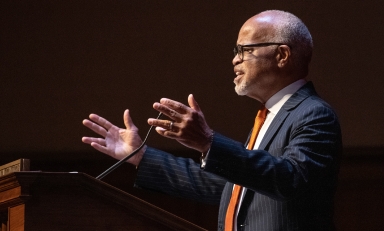A 21-member task force examines the intricacies and urgencies of Oxy's financial aid program
Financial aid made it possible for Rick Rugani '75 and his siblings—older brother Frank '70 and younger sister Maria '78—to get an Occidental education. "There's no way our family would have been able to finance all the kids going to college," he says. For Eileen Brown '73, a first-generation college student whose father died unexpectedly at the start of her sophomore year, financial aid made all the difference. "I still remember that tuition was $2,400 a year, because I had to pay for it," she says.
Their personal experience made the two trustees obvious choices to co-chair Oxy's Student Access and Opportunity task force. Meeting three times over the course of six months, the group of 21 alumni and parents was asked to examine "the intricacies and urgencies" of the College's financial aid program as Oxy prepares for its first com- prehensive campaign in more than 20 years.
In an era of rising college costs, the task force's agreement on the importance of financial aid was hardly a surprise. More significant was the recommendation to the Board of Trustees that the College focus on building the endowment not only to provide access to an Oxy education through student scholarships, but also for travel, research, and internships—the kinds of transformational opportunities that are an integral part of an Oxy education.
While more than 370 endowed scholarships make up almost half of Oxy's endowment, generating nearly $10 million annually, that accounts for just 22 percent of the overall financial aid budget (which totaled $45.9 million in fiscal year 2017-18). The rest comes directly from the College's operating budget ($113.2 million in 2017-18).
"The task force gave me a better understanding of the challenges College managers face in providing needed scholarships to talented Oxy students," says Rugani, a political science major and retired independent financial adviser who spent more than two decades in the investment banking industry. "It's clear that building the endowment is going to be central to Oxy's ability to continue to fulfill its mission."
While earning her degree in psychology, Brown, an attorney and real estate developer, was working 20 hours a week in the library in addition to a series of summer jobs. "When a student comes in with a large financial need, they don't have the means to do the kind of things that other people take for granted, like having an internship," she says. "The idea of looking beyond the classroom and tuition, room, and board when thinking about scholarships hadn't really occurred to me before. That's made me much more excited to be raising money for scholarships."
The committee also looked beyond the numbers to understand how Oxy students experience the financial aid process. "What really stood out was the care and effort our financial aid officers invest in trying to put together resources for incoming students," Rugani says. "That work is underappreciated."
Committee member Bonnie Mills '81, who majored in history and transferred to Oxy after two years at Connecticut College, was similarly impressed with the personal attention provided by staff: "That's not something you see at big universities."
"I was really fortunate to get a Luce Scholarship, which was the direct result of Dean [William] Gerberding grabbing me as I walked out the door of a meeting for graduating seniors and saying, 'You should apply for this scholarship,'" Rugani adds. "It comes down to those personal experiences for all of us, the small college experience."
To ensure that other students have the same opportunity they had, Rugani, Brown, and Mills have all set up annual or endowed scholarships. "To me, we're doing something that's really special," Brown says. "I'm proud that Oxy has taken on this as its primary mission, giving students access to a liberal arts education."



